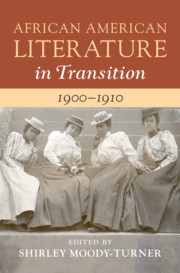Book contents
- African American Literature in Transition, 1900–1910
- African American Literature in Transition
- African American Literature in Transition, 1900–1910
- Copyright page
- Contents
- Figures
- Contributors
- Preface
- Acknowledgments
- Chronology, 1900–1910
- Introduction
- Part I Transitions in African American Authorship, Publishing, and the Visual Arts
- Part II New Negro Aesthetics and Transitions in Genre and Form
- Chapter 4 African American Novels and the New Slavery in the New South
- Chapter 5 Anti-Lynching Poetry and the Poetics of Protest
- Chapter 6 The Politics of Performance, Character, and Literary Genre in Transition
- Part III Modernist Masculinities and Transitions in Black Leadership
- Part IV Remapping the Turn of the Twentieth Century
- Index
Chapter 5 - Anti-Lynching Poetry and the Poetics of Protest
from Part II - New Negro Aesthetics and Transitions in Genre and Form
Published online by Cambridge University Press: 29 April 2021
- African American Literature in Transition, 1900–1910
- African American Literature in Transition
- African American Literature in Transition, 1900–1910
- Copyright page
- Contents
- Figures
- Contributors
- Preface
- Acknowledgments
- Chronology, 1900–1910
- Introduction
- Part I Transitions in African American Authorship, Publishing, and the Visual Arts
- Part II New Negro Aesthetics and Transitions in Genre and Form
- Chapter 4 African American Novels and the New Slavery in the New South
- Chapter 5 Anti-Lynching Poetry and the Poetics of Protest
- Chapter 6 The Politics of Performance, Character, and Literary Genre in Transition
- Part III Modernist Masculinities and Transitions in Black Leadership
- Part IV Remapping the Turn of the Twentieth Century
- Index
Summary
Although scholarship on anti-lynching literature generally is robust, most focuses on prose and drama. In parallel, although increasing attention is being devoted to turn-of-the-century poetry, this discourse still often diminishes women’s contributions to this oeuvre by denigrating the aesthetic qualities and political intentions of most female poets in this period other than Frances Ellen Watkins Harper. Addressing both gaps, this chapter examines anti-lynching verse by three undeservedly little-known authors: Priscilla Jane Thompson (1871–1942), Katherine Davis Chapman Tillman (1870–1922), and Lizelia Augusta Jenkins Moorer (1868–1936). All have been nearly ignored, except for discussions of their dialect poetry. Yet close attention to examples of their formalist verse demonstrates that these poets were not anomalies in their era and instead constituted a key link in a tradition of Black women’s poetics of protest, traceable to Harper and to Phillis Wheatley before her. Ultimately, their poems on this subject offer a new lens on this decade, often unfairly viewed as a pre-Harlem fallow period in African American women’s poetry and political contributions.
- Type
- Chapter
- Information
- African American Literature in Transition, 1900–1910 , pp. 124 - 145Publisher: Cambridge University PressPrint publication year: 2021

